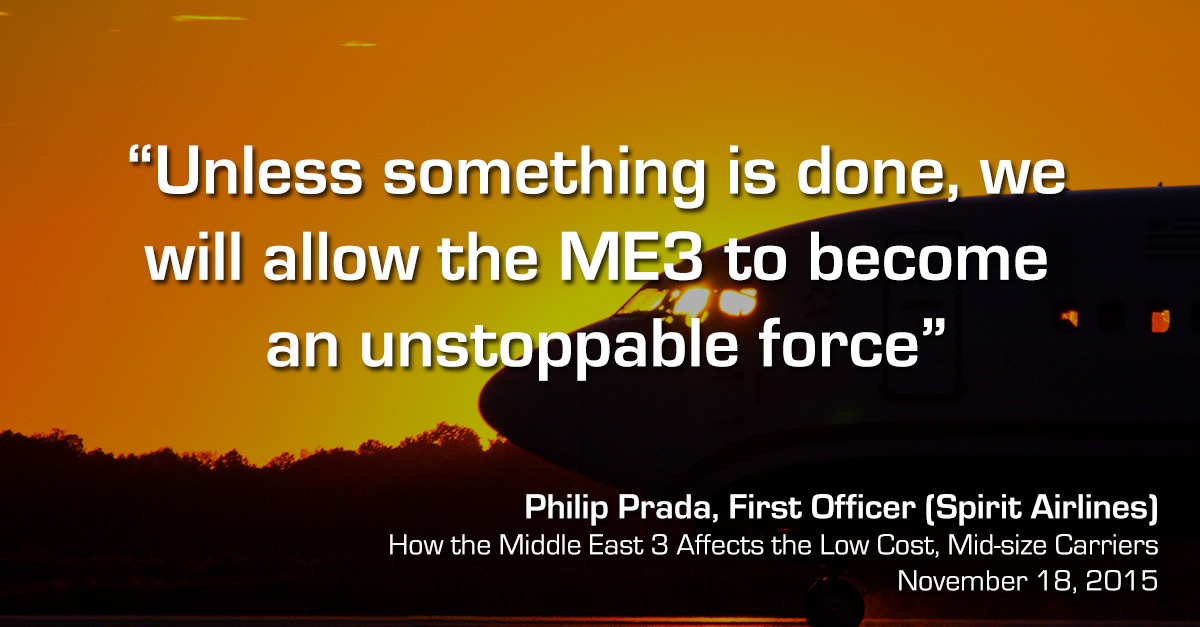By Philip Prada, First Officer, Spirit Airlines
Over the last decade, three state-owned carriers in the Middle East (Emirates, Qatar, and Etihad = ME3) have received more than $42 billion in subsidies and other unfair benefits. On the surface, it’s easy to see why my fellow pilots who fly for low cost carriers don’t believe this issue impacts them. The initial thought is that this only impact international flying at American, Delta, and United. But, the tie is much more closely linked to low cost carriers and regionals. Let me tell you why as a Spirit pilot, I am highly concerned about the impact on the low cost carrier market.
While U.S. airlines compete fairly in our free market, the ME3 carriers are cheating the system and playing by their own rules. They want to dominate the American market – the largest, most lucrative air service market in the world – and are cheating to win. The schemes that the governments of Emirates, Qatar and Etihad use to infuse money into their airlines so they never have to show a profit come in the form of direct capital injections and interest free loans that have no repayment schedule. Of the $42billion, $3.3 billion was spent for the construction of terminal 3 in DXB, Emirates new, exclusive use A380 hub.
The ME3 also saved $3.1 billion in the last 10 years by having non-unionized labor because unions are illegal in the UAE and Qatar. The New York Times reported that the conditions in the UAE were “indentured servitude.” According to Qatar CEO, Al Bakar, “if you did not have unions, you wouldn’t have this jobless problem in the western world”.
When everything is linked together, what frightens me the most is the “Equity Alliance” program Etihad has. Using government subsidies, Etihad purchases investments in many failing airlines. These airlines, including Air Berlin, Virgin Australia, and Alitalia, weren’t able to turn a profit for a reason. Instead of failing or changing, as operators in the free market must, these airlines are finding new life as feed for Etihad’s global carrier.
With the advantages noted above – all due to government intervention on behalf of their airlines – what will the ME3 do to our industry? If allowed to continue their subsidized advance into our market, what will stop them from not only competing with US3, but the LCCs and mid-sized carriers as well? Let’s be honest, if these carriers put a B-777 on FLL-LIM or MIA-PTY, or PBI-AUA at a competitive price point, which airline would passengers choose? It is not just the big three airlines that have to worry. We are all affected and, unless something is done, we will allow the ME3 to become an unstoppable force.
We have already seen the results in other parts of the world. Australian carrier Qantas has cut international flying back since Emirates’ entry. European carriers are now cutting flying and laying off pilots.
The ME3 argument is competition. If they offer a better service for less, isn’t it just simple competition, simply “just running an airline” as Akbar Al Baker, CEO of Qatar Airways states. “Choice, it’s a wonderful thing”- Emirates’ slogan. My own airline, Spirit, often makes similar arguments. However, Spirit didn’t receive $42 billion in free money from our government. We’re building our airline under the same rules everyone else is playing by: make a profit or die.
Through our Open Skies agreements, the ME3 have access to the nearly 500 commercial airports in the U.S. and in return we have access to their three. Don’t get me wrong, the U.S. Open Skies agreements has been extremely beneficial to the U.S. Open Skies is meant to promote liberalization and remove government influence from the international air service market and to ensure a fair and equal opportunity to compete for all. But, those same Open Skies agreements which allow the ME3 to fly here actually forbid these kinds of market distorting subsidies. We have the right to tell those nations to either play by the rules, to operate their airlines under in a free market, or cancel the agreements.
This part, however, involves all of us. Our administration needs to be convinced that this is a priority for ALL pilots and the entire U.S. airline industry. Every pilot should contribute to ALPA-PAC, fill out the call-to-action, and participate in ALPA’s district advocacy program. Only through all of us voicing the truth will we win on this and every other pilot partisan issue.


